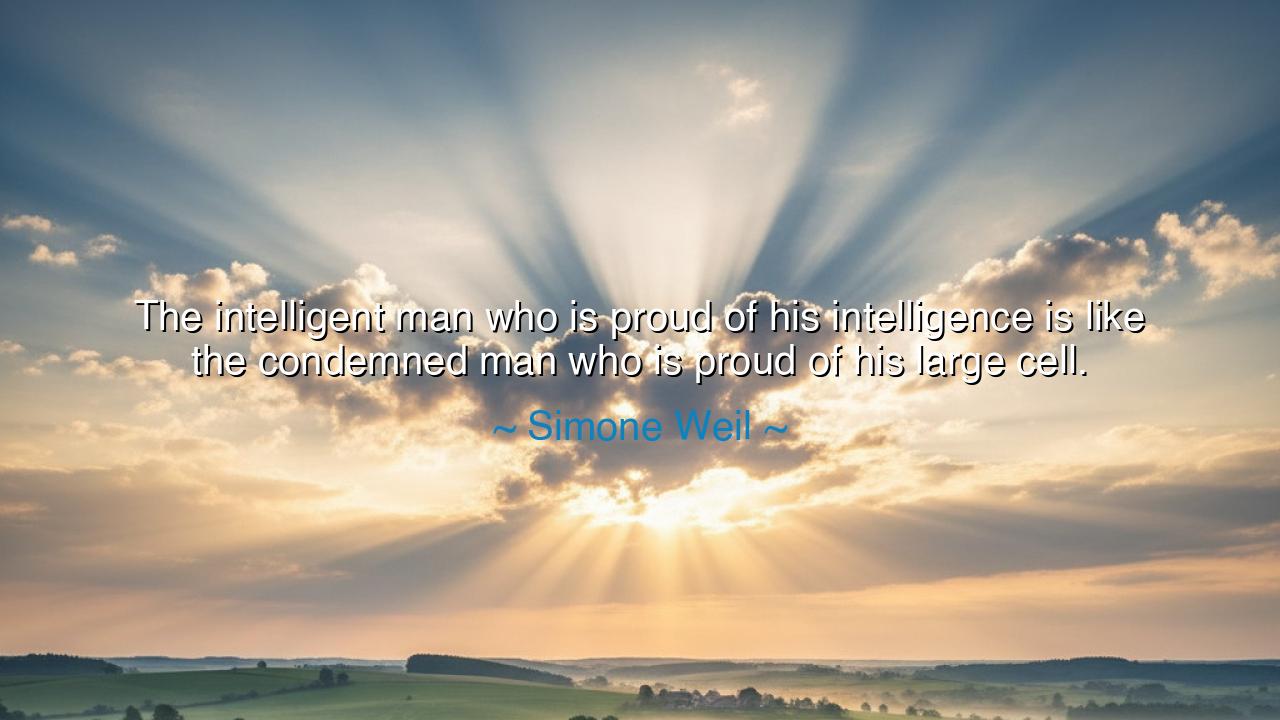
The intelligent man who is proud of his intelligence is like the
The intelligent man who is proud of his intelligence is like the condemned man who is proud of his large cell.






In the luminous and piercing words of Simone Weil, the mystic philosopher and servant of truth, we find this timeless warning: “The intelligent man who is proud of his intelligence is like the condemned man who is proud of his large cell.” These words strike the heart with both beauty and severity, for they reveal a paradox that every seeker of wisdom must one day face — that intelligence, the very gift we treasure as the crown of our being, can also become the gilded prison of the soul.
The origin of this quote lies in Weil’s writings on humility, intellect, and the spiritual nature of truth. A philosopher who walked among the poor, labored in fields and factories, and sought God in the midst of suffering, she understood that intellect — though powerful — is limited. In her eyes, intelligence was not an end in itself, but a tool meant to serve truth, compassion, and divine understanding. When it becomes a source of pride, it ceases to liberate and begins to enslave. Thus, she compares the proud intellectual to a prisoner rejoicing in the size of his cell — unaware that he remains confined, still separated from the infinite expanse of truth and grace.
To be proud of intelligence is to mistake possession for transcendence. The mind, vast though it may seem, is but one chamber of existence, and pride seals its door. The wise man, Weil teaches, does not boast of his mind’s brilliance, for he knows that intellect without humility becomes a closed circle — a system that can describe the stars yet fail to see the heavens. Like the condemned man admiring his large cell, the proud intellectual may have more space for thought than others, but he is still bound by the walls of ego and ignorance.
Consider the fate of Descartes, who sought to prove all truth through reason alone. His philosophy built a towering edifice of logic, yet within it he found himself trapped — a self doubting its own existence, a soul exiled from certainty. Contrast him with Socrates, who, when called the wisest man in Athens, replied that he knew only that he knew nothing. Socrates’ humility opened him to endless learning, while Descartes’ pride in reason confined him to a fortress of doubt. Thus, Weil’s metaphor unfolds in every age: intelligence without humility is a grand prison; humility without intelligence, though small, may yet hold the door to freedom.
There is also a moral warning here. Pride in intelligence often leads to separation — the intellectual’s disdain for the simple, the learned man’s contempt for the believer, the thinker’s cold detachment from the living world. But true wisdom, as Weil knew, unites rather than divides. The saints, poets, and sages who changed the course of history — from Francis of Assisi to Albert Einstein — carried their intelligence lightly, as a candle, not a crown. They understood that knowledge is sacred only when it serves love and justice, not vanity.
Weil’s words also remind us that intelligence alone cannot save humanity. Empires have fallen at the hands of brilliant strategists; atrocities have been justified by eloquent intellects. The mind, ungoverned by compassion, becomes cunning rather than wise. The condemned man’s cell may be large and finely built, but it is still a place of death. Only humility — the recognition that there is truth beyond our understanding — can break the lock. The truly intelligent man, then, is not the one who knows most, but the one who kneels before the mystery of life and learns from it.
Therefore, O seeker of knowledge, take this teaching into your heart: do not be proud of your intelligence — use it to serve what is greater than yourself. Let your thoughts be like windows, not walls. Learn, but never cease to wonder. Think deeply, but love more deeply still. If your mind is your gift, let humility be its keeper, lest the gift become your cage. Remember always that the light of the intellect is brightest when it shines not upon itself, but upon the world it seeks to understand.
And so, as Simone Weil teaches across the centuries, the path to true wisdom lies not in enlarging the cell of thought, but in finding the key to freedom. That key is humility — the sacred understanding that even the greatest intelligence is small before the infinite. Only when the mind bows to the truth of the soul does knowledge become wisdom, and wisdom become grace.






AAdministratorAdministrator
Welcome, honored guests. Please leave a comment, we will respond soon